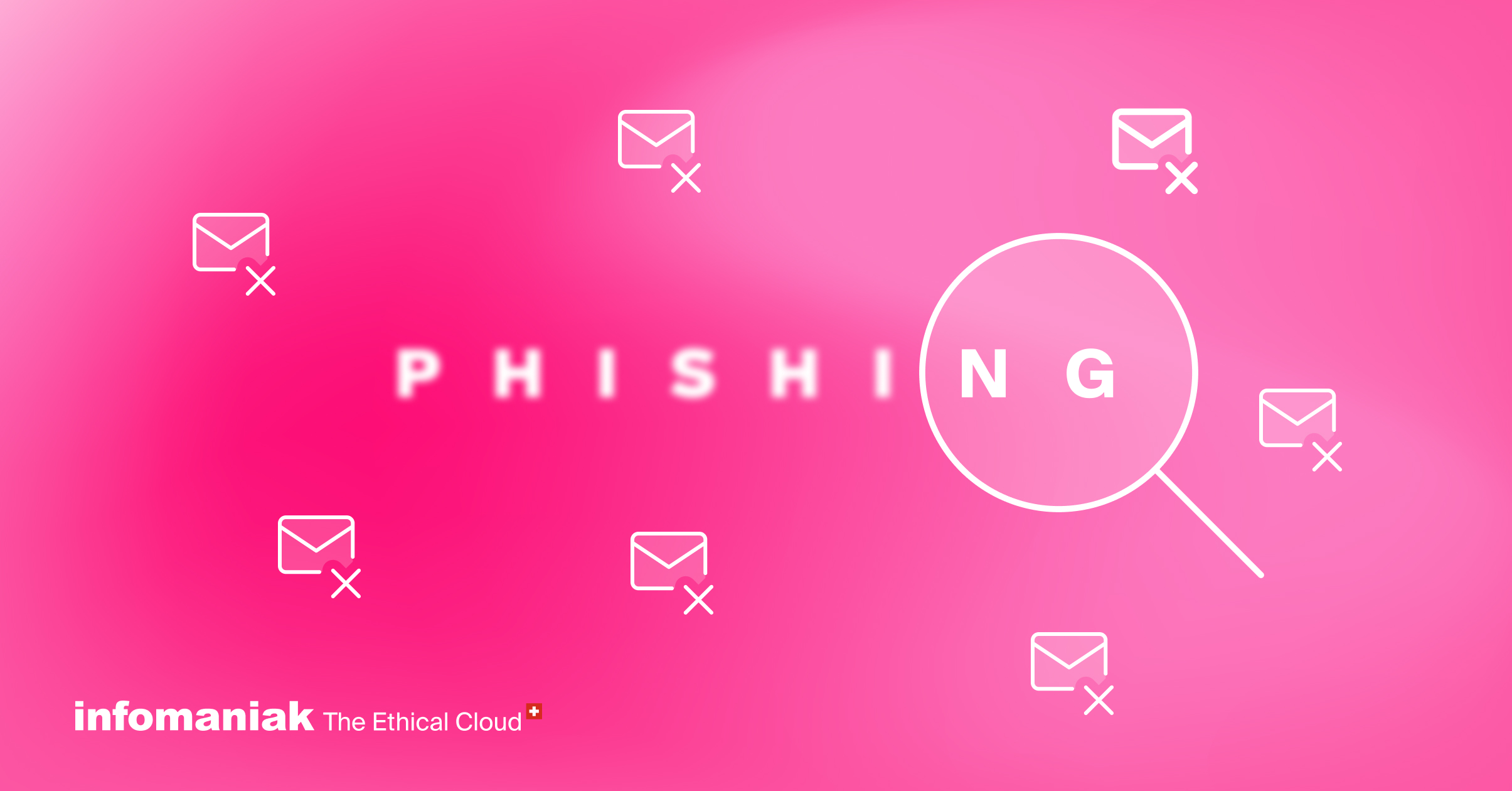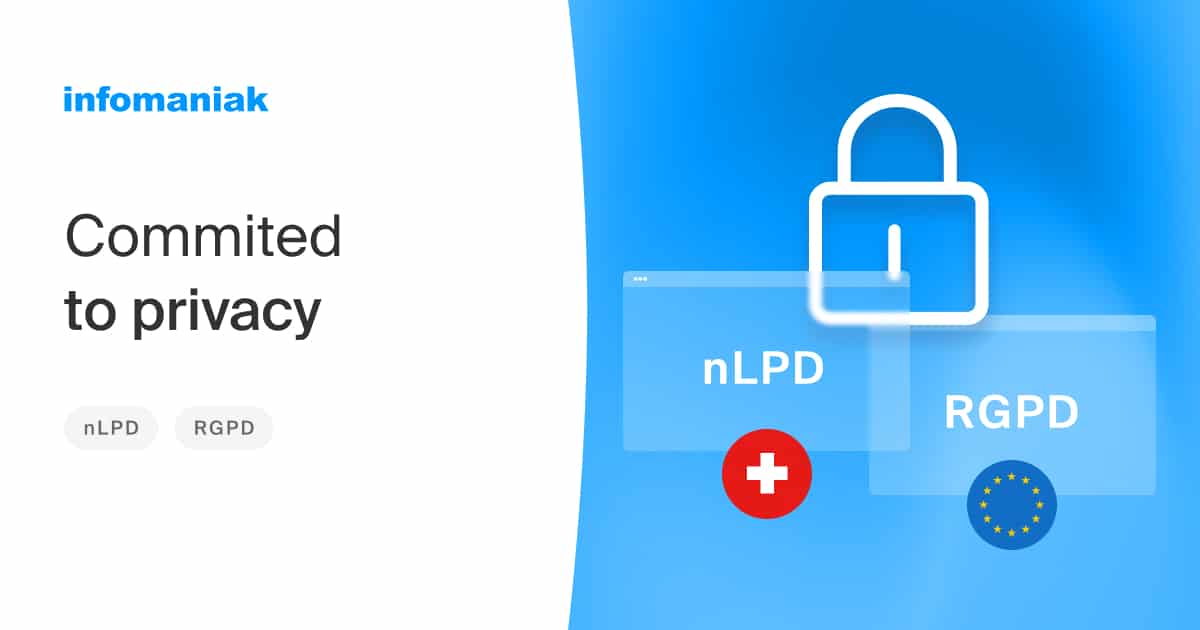Relied on by more than a million users throughout Europe, Infomaniak’s webmail is one of the few fully independent, sovereign email solutions on the market. This privacy-friendly tool is popular with SMEs and the result of more than 20 years of experience.
We went to meet the enthusiasts developing the webmail service – an opportunity to learn about the history of this Swiss-made alternative to the web giants.
A European alternative to Gmail and Outlook that’s flexing its muscles
Far more than a mere online email service, Infomaniak’s webmail synchronises your emails, contacts and appointments between all your devices. It meshes with the tools in the Infomaniak Suite such as kDrive and kMeet, which makes it a real collaborative “WorkSpace”.
“It’s a great feeling to develop a solution that has over a million users. The WorkSpace is propelled by enthusiasts, some of whom have been at it for over 20 years,” says Julien Arnoux, Lead Developer. He adds: “Infomaniak’s growth allows us to imagine ambitious features, such as a Doodle-like solution or assisted appointment scheduling. This is just the start.”
Infomaniak launched its webmail in 2003, i.e. before Gmail. The idea of a 100% in-house solution was already making sense, even back then: firstly, it meant not being dependent on technology that Infomaniak couldn’t control, and secondly, it allowed us to provide a custom service that could evolve in line with our customers’ needs.
“Gmail didn’t exist in 2003 and webmails back then had stark-looking interfaces. That’s when we decided to develop our own webmail, so as to have a modern solution that was a perfect fit with our infrastructure. That was Infomaniak’s first major internal project, aside from the 100% in-house admin console that was already managing our entire web and email hosting offer.” Johann Gouin, Development Manager
Technological challenges underpinning a fully independent ecosystem
Webmail must, at minimum, ensure reliability, security, confidentiality and future evolution. Its technological constraints are determined by the popularity of the tool.
Deliverability, spam and viruses challenges
Distributing emails and providing protection from threats: that’s what a webmail service should be about. It sounds simple enough, but it calls for significant resources:
- Conventional filtering: several spam filters and antivirus scanners are deployed do the initial coarse filtering.
- AI filtering: automated artificial intelligence is then deployed to detect suspicious behaviour and block IPs that attempt to access our SMTP platform fraudulently by brute force (currently some 10,000 per day).
These protective measures mean our email servers are extremely well ranked by other providers. This aspect is essential in ensuring that your emails don’t end up in your recipients’ spam folders.
The security challenge
- Protection against phishing: Infomaniak’s webmail detects suspicious links and automatically warns users of potential risk. This makes it easy to identify malicious emails that attempt to impersonate a reputable company to steal sensitive information. Users can also report suspicious messages to help strengthen our intelligent filters.
- SPF, DKIM and DMARC security standards: users benefit from the best security standards by default, which further boosts the deliverability of your emails. These standards ensure that emails aren’t altered in transit.
- Automatic backup and restore: to safeguard data resilience, we systematically back up emails for seven days using a different datacenter to the one used for storage. If necessary, it’s very easy to restore a backup in the event you make a mistake.
The reliability challenge
“Our testing protocols are so effective that we’re able to roll out updates at any time of day, knowing we’ll have no problems.” Julien Arnoux, Lead Developer
Every change made to the webmail service follows a strict quality pathway. Bug fixes, improvements, new features – you name it, the approach is pretty much the same:
- The task is defined in detail
- A team of developers works on it
- The code is deployed in its own environment each time it’s modified, and various batteries of tests are conducted automatically (unit tests, end-to-end tests, code quality and security analysis)
- To get the changes approved, a systematic and mandatory code review is carried out by other developers
- Once the various approvals have been obtained, the code is automatically and progressively rolled out to users
Should a problem occur, it’s possible to revert to a previous version of the code in less than a minute without users noticing anything. This latter mechanism is the ultimate safeguard in the event of an error.
Infrastructure that’s fully redundant
All the components are redundant, which allows us to deal transparently with customers in the event of changes or outages. Every email is stored on at least three servers in at least two datacenters for even greater peace of mind. Daniele Mazzocchio, System Engineer
In the past, each email server contained its own clients, IMAP server, indexing, etc. Redundancy was limited to the storage of emails. This architecture acted as a brake on performance and prevented full redundancy of the service (sending, storage and receiving servers).
Now, though, the WorkSpace benefits from advances in our cloud infrastructure. There are half as many physical machines but twice as many virtual machines (VMs) as there used to be. We’ve cut the number of redundant machines from 200 to 100, which reduces the environmental burden linked to server production and power consumption and increases the reliability of the service, which is now fully redundant.
Server storage
The storage part of the server is now separate from the IMAP. These servers use ZFS to provide users with backup snapshots. ZFS also enables data compression of around 15%. Everything is redundant between Infomaniak’s datacenters.
Indexing
At the same time, the WorkSpace’s architecture includes KVM hypervisors with separate MDAs as well as hypervisors dedicated to indexing. These run 100% on SSDs to speed up the search functions. The indexing servers are also redundant between our datacenters.
Outgoing and incoming servers
The WorkSpace’s independent outgoing and incoming servers are resilient. They’re also replicated between our datacenters.
Why go for an independent and sovereign webmail service?
An email service that keeps evolving
Because we have full control of our technology, we’re able to keep improving and developing new features based on user feedback.
Here’s a non-exhaustive list of features and improvements that we intend to roll out progressively:
- An interface that’s fully responsive and optimised for mobile devices
- Scheduled email sending
- A wizard for scheduling appointments in line with the availability of the participants
- A Doodle-like tool for easily finding a date
- Label management
- Default notifications choice
- A dedicated mobile app made by Infomaniak
Your best guarantee of security and confidentiality
The email address is central to everyone’s life. Whether it’s for business or private use, we depend on it to communicate, shop online and access all our online services. This concentration of personal and/or private data is a valuable asset, a digital footprint that must be protected.
Infomaniak has been storing the information of thousands of companies, institutions and individuals for more than 25 years. Security and data protection are built into each stage of the design process and regularly tested by independent researchers or as part of specific penetration-testing interventions.
Since we control our messaging service from end to end, we’re able to deliver on our security and privacy commitments. What’s more, Infomaniak is wholly owned by its employees and founders and not subject to external interests.
Data isn’t analysed or resold
Our business model serves the interests of our users, not advertising companies or governments. Whether the product is free or paid for, we never analyse the data to monetize them. Infomaniak finances its free services through sales of high-value-added products.
Reduced attack surface
From a technical point of view, Infomaniak’s independent technology offers hackers little opportunity to launch attacks. From a legal point of view, Infomaniak’s webmail service is GDPR-compliant and benefits from the safeguards conferred by Switzerland’s data protection legislation, one of the strictest in the world.
How to access Infomaniak’s webmail service
Any email address hosted by Infomaniak provides access to our ecosystem of online services:
From UIKit to SwiftUI: developing an iOS mobile app with the latest Apple framework
Monday March 25th, 2024

 Français
Français Deutsch
Deutsch Italiano
Italiano Español
Español




